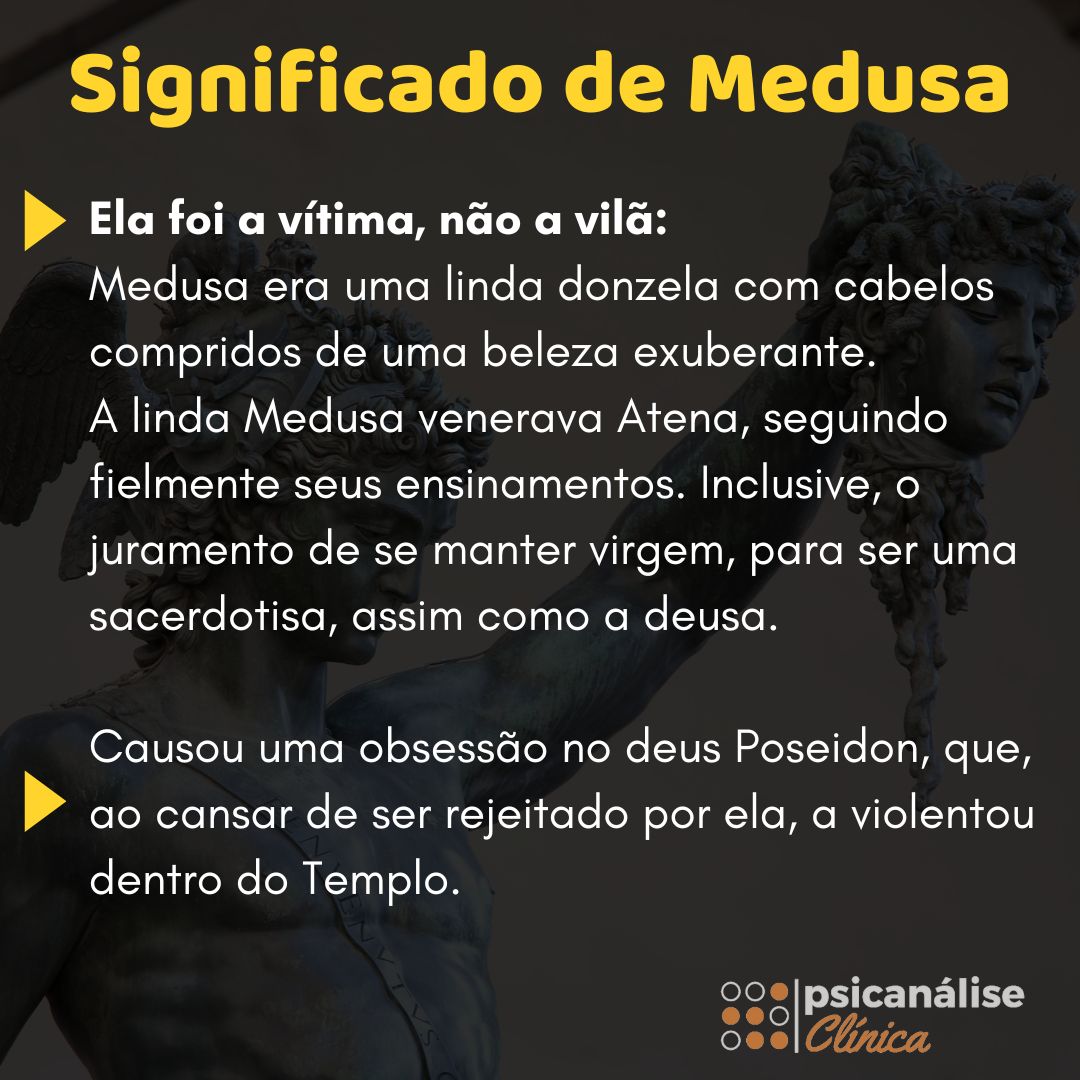Table of contents
First of all, it is known that Greek mythology is full of curious figures, full of plots, magic and tricks. Among them, possibly you have heard about the mythology of Medusa. So, to better understand about the meaning of Medusa we will bring you the historical versions about two aspects .
There are two sides to the mythology, where in the older one Medusa is portrayed as a monster, feared and evil. When later the truth about Medusa was revealed, she was a victim of violence, abuse and curse.
See_also: The Anna O case interpreted by FreudMeaning of Medusa
Medusa is among the most significant characters in Greek mythology, with a story that goes beyond what is popularly told. The meaning of Medusa, basically, is the r etrate of a woman, with sharp teeth, a large tongue, and the striking serpents in her hair.
See_also: Impatience: what it is and how it affects our relationshipsIn addition, a significant characteristic was her ability to turn people into stone with just a look, that is, all she had to do was look at someone and that person would quickly turn into a rock.
First version of Medusa in Greek mythology
In the earliest version of Medusa, later considered to be the wrong one, Medusa was a villain. In the meantime, one of the three Gorgonian sisters, but unlike her sisters Estheno and Euryale, Medusa was mortal. Daughter of the marine deities, Phocis and her sister Ceto, was a monster from Greek mythology according to the characteristics described above.
In this story, Medusa and her sisters were not actually women, but were born as a monster, unrelated to a curse. According to this myth, Medusa resided in the far west of Greece, and was a source of terror to all the people in her region.
Her power was so intense, that not only was she feared by normal people, but also caused terror in gods and demi-gods Among these, one god had the courage to approach her, Poseidon, with whom she had a loving relationship.
Besides Poseidon, another god also approached Perseus, but with the intention of killing her. A mission given by King Polydectus, and, as a reward, he would be free to marry Perseus' mother, Dânae. First impossible, it became easy, as he had the help of other Greek gods.
Perseus and the Death of Medusa
Then Perseus enlisted the help of other gods to finally defeat the dreaded jellyfish. So these help were:
- Hermes, son of Zeus, gave him sandals that allowed him to fly, making it easier for him to move around;
- Zeus, supreme god of Olympus, secured a sharp sword, to cut off Medusa's head;
- Hades, son of Kronos and Reia, provided a helmet that made him invisible;
- Athena gave him a reflective bronze shield, which he could see in the reflection and thus not be petrified by Medusa's gaze.
As a result, Perseus approached Medusa while she was sleeping, using his reflective shield to guide him and avoid the Gorgon's gaze. Soon, with his sword, he cut off her head. Death under which made Perseus of great mythological fame.
However, Medusa never rested in peace after her death, and some historians tell that from the Gorgon's neck Pegasus, a winged horse that was a companion of Hercules, and the giant Crisaor, were born.
Even more, it is said that Perseus used Medusa's head as his weapon He then gave his head to Athena, who used it as a shield to petrify her enemies.
Second version: Meaning of Medusa before the curse

The previous story is possibly the one you have always heard, but it is not the real myth about the meaning of Medusa. Beforehand, know that she was the victim, not the villain. The poet Hesiod wrote in his works between the years 650 and 750 B.C. that Medusa was the victim of sexual abuse by the god Poseidon.
In this version, Medusa was also the mortal daughter among the three Gorgons who lived in the Temple of Athena, goddess of wisdom, war and who held the power over the Greek region. Medusa was a beautiful maiden with long hair of exuberant beauty.
The beautiful Medusa worshipped Athena, faithfully following her teachings, including the oath to remain a virgin, to be a priestess like the goddess. However, because of her unparalleled beauty, Medusa attracted many men to the Temple, who often courted her, a fact, of course, that was not her fault.
I want information to enroll in the Psychoanalysis Course .
Read Also: Piper Discovering the World: Film Interpretation
Among them was the god Poseidon, Athens' uncle, who had previously disputed power with the goddess, a conflict which Medusa had no connection with, but who ended up as a victim. When he got tired of being rejected by her, he raped her inside the Temple .
However, Athena did not believe the young woman, imagining that she had seduced Poseidon. As a result, Medusa was punished by the goddess, with a curse. Since Athena believed that Poseidon only followed his instincts as a man by violating the Temple and getting involved with the beautiful young woman.

The curse of Athena in the Medusa myth
With Athena's curse, Medusa was transformed into a terrible monster, whose image we know, with the following characteristics:
- hair with snakes;
- body covered with scales;
- teeth of wild pigs;
- any man who looked at her would turn to stone.
In this way, Medusa became living isolated in a cave on the edge of Greece, in solitude So, just as in the previous version of the story, Poseidon was sent to kill Medusa, and did so. However, for different reasons; this time he was forced to do so by King Polydectus, under threat of abusing his mother.
In short, Medusa was a beautiful woman, who ended up abused, cursed and decapitated, having done absolutely nothing wrong. Also, the story goes, soon after her death, Medusa's neck started to come out. Then, the winged horse Pegasus and the giant Crisaor appeared, fruits of Poseidon's sexual abuse.
Medusa Mythology: Medusa's meaning and symbolism today
Because of the last version of the mythological story of Medusa, she became a symbol of struggle for women who were victims of silent persecution. After the revelation of this version, said to be true, throughout the ages, Medusa was the character of many representations in the world of art.
Thus, she became a victim instead of a villain, correcting her past mistakes about the exuberant young woman being a cruel monster.
Therefore, studying Greek mythology gives us, through the story of its characters, countless reflections on life, especially on the behavior of mankind. meaning of Medusa is a classic example, which makes us rethink about the social injustices suffered by women who are victims of sexual violence, not least because Medusa has become a symbol of struggle for women.
So, if you have reached the end of this article about the meaning of Medusa, you possibly like to know about history and how society has developed. Which, in mythology, is given by metaphors, much is told about people's feelings, emotions and behavior. So, we invite you to get to know our Training Course in Clinical Psychoanalysis, where you will learn about behaviorKnow that understanding how the human mind works will benefit you in many ways, such as, for example, in the enhancement of self-knowledge and improvement in social relationships.
Finally, if you enjoyed this article, please like and share it on your social networks. This will encourage us to continue producing quality content.
I want information to enroll in the Psychoanalysis Course .
